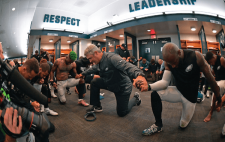First thing’s first: Laura Tolver is delightful.
She’s warm and chatty, with a laugh that seems to bubble up and out of her. She jokes about herself in a way that’s not so much self-deprecating as utterly relatable.
Even speaking during her early-morning commute home from a long overnight shift in Cooper Hospital’s trauma ICU, she is peppy and animated. The contrast between Tolver’s lively demeanor and the bleak, painful story she’s telling is jarring.
On Aug. 12, 2012, Tolver, then a United States Marine, slept in her barracks at Camp Lejeune, near Jacksonville, North Carolina. During the night, she was raped and beaten by a fellow Marine – someone she knew, but whose name she won’t share because the ensuing investigation was inconclusive.
With the exception of that detail, Tolver is remarkably candid about what happened to her.
“You know when you’re asleep and somebody sits on the edge of the bed and it wakes you up?” she says. “It’s so vivid in my mind; I woke up from the weight of something on my bed. When it was over, he left. I feel like I sat in the same spot for an hour. But it could also have been three minutes.”
This is not a story about a rape. That’s what happens in the middle of it, but there’s also a beginning and (spoiler alert) a happy ending. Let’s back up for a moment.
Tolver grew up in a family of strong women. She’s named after her grandmother, who earned an Ivy League bachelor’s degree and a master’s, then became a nurse in an era when opportunities for African-American women were limited.
Tolver graduated from high school in 2005, the same year her mother, who suffered from congenital heart defects and renal disease, passed away. Though Tolver had enrolled at Wilmington University, without her mom around she found herself rudderless.
“She died about a month and a half after I left for school,” Tolver says. “I found out I had to pay this huge [tuition] bill. I was an only child; I had no idea what I was doing and no idea what resources were available to me.”
Tolver left school and enlisted in the Marine Corps. Soon she was an aircraft mechanic working on the MV-22 Osprey helicopter, living and working on base in North Carolina.
“Not having the financial wherewithal to pay for school is what made me join the Marine Corps,” she says, “but I’m a firm believer in purpose. In retrospect, I can look back and know I always had a direction I was going in. I was always going to do something that mattered and that helped people.”
Tolver became a well-decorated and well-respected Marine. She was named Recruit Honor Graduate upon completing boot camp, received Meritorious Masts and was awarded Squadron Marine of the Quarter.
“I had letters of appreciation and commendations; I was a stellar Marine,” she says.
She also developed close friendships with the Marines in her unit, despite the long list of differences between them and Tolver.
“I’m a black, female Marine,” she says. “That means I represent 1/400,000th of the U.S. population. I was in a place where people would say things to me like, ‘Tolver, you’re pretty cool for a n****r’ or, ‘I never met a n****r I liked until I met you.’ Most of these guys had enlisted right out of high school. I had already lived life, gone to college and lost a parent. I’d already had to pull myself up by the bootstraps and recover. I had a little life experience under my belt, and that set me apart.”

Laura Tolver with members of her Marine unit at Camp Lejeune; Photography By Chris Hartlove
Still, she says, those men became her brothers.
“We were in the same cycle in boot camp and went into the fleet together,” she says. “We’d suffered and persevered together. They were my family.”
After her assault, everything changed.
“The rape itself was far less complicated and hurtful than what came after,” she says. “The night it happened I went and knocked on my neighbor’s door – a close friend of mine – and he walked me down to report it to the officer on duty. The officer told me to go back to my room and report it to my Uniformed Victim Advocate in the morning. So I did what I was told, but I wasn’t going to sit there like that, so I went into the bathroom and washed myself. I watch enough “Law & Order SVU” to know that was the wrong choice.”
The next morning, Tolver tried to follow protocol to report her assault, but instead encountered what she says was a combination of ineptitude and skepticism among her superiors.
“I told my story, then told it again when the victim advocate got there, then I had to be examined,” she says. “Some woman was doing my exam, and when I flinched at the speculum, she said, ‘Oh, it’s no bigger than a penis!’ Before she even finished there were two NCIS [Naval Criminal Investigative Services] agents there to talk to me. They took my journals and my computer and dusted for prints in my room. Everything was covered with black dust that I had to clean up. I think they still have my bedspread, which I paid full price for at Target. The whole thing was bizarre. It was a mess.”
Using her journals, which were a part of her personal, spiritual journey and contained what she calls her “Dear God letters,” Tolver says the investigators twisted her words to discredit her. Her rapist was never disciplined.
“It wasn’t a secret that the investigators didn’t believe me,” she says. “They made me out to look like a liar. The superiors were just gossiping with the guys, and they treated me like I’d made this all up. I still love the Marine Corps – but the Marine Corps betrayed me.”
For six months, Tolver stayed at Camp Lejeune, showing up to work every morning and spending the rest of her time alone in her room. The bonds she’d formed with her fellow Marines seemed to dissipate.
“I was miserable. I had anxiety. I couldn’t sleep,” she says. “I had depression and thoughts of suicide. Not only was I raped, I was suddenly completely alone. Whatever support system I may have had was stripped from me.”
Tolver says she went home – an eight-hour drive – nearly every weekend to avoid the isolation of being on base.
In the spring of 2013, less than six months after her assault, Tolver’s father suffered a brain injury and was hospitalized. It was the final straw for Tolver, and she told the military she was done; the Marine Corps wasn’t taking care of her, and she needed to take care of her family. She served out a few more months at Joint Base McGuire-Dix-Lakehurst in Burlington County and was honorably discharged in December 2013.
After spending so many hours with her father in the hospital and interacting with his medical team, Tolver realized nursing was her calling. In the course of eight months, she finished her bachelor’s degree at Wilmington University and completed a second accelerated bachelor’s with the pre-requisites for nursing school.
“I had a 4.0 science GPA and a 3.85 overall GPA,” she says. “I applied to every nursing school in South Jersey and Philadelphia, and everybody denied me.”
Three weeks before classes started, she met Frank Davis, head of the Office of Veterans Affairs at Rutgers University-Camden, who made some calls. Just like that, Tolver was enrolled in the school’s Doctorate of Nursing program.
Tolver also applied for the Pat Tillman Foundation Scholarship, a selective award that honors the sacrifice of Tillman, who left a career in the NFL to serve in the military and was killed in Afghanistan.
“When the application asks, ‘How did your service change your life?’ I’m sure no one expects you to talk about how you were raped,” Tolver says. “When they called and said I’d made it to the interview stage, I thought, ‘Phew, this is going to be an awkward conversation.’”
In July, Tolver found out she’d won the $20,000 scholarship. She was one of only five nursing students in the country to be named a Tillman scholar, and the only one in New Jersey.
In addition to serving South Jersey families in Cooper’s ICU and working toward her next degree, Tolver has begun speaking out about her assault and everything that came after.
“It took me five years of Sundays,” Tolver says, “but I believe all things work together for good. This happened to me because I can talk about it, and I can help other people.”
Tolver has spoken to N.J. State Sen. Jim Beach and other local officials, who hope to start programs to address on-campus sexual assault cases in South Jersey. She also dreams of opening a mobile clinic to bring medical care to underserved populations.
“I’ve lost so much, but there is so much to gain,” she says, her trademark optimism wildly apparent. “I’ve made it through this, I’ve come out the other side, and now I’ve got this incredible story. No one and nothing can take that away from me.”














